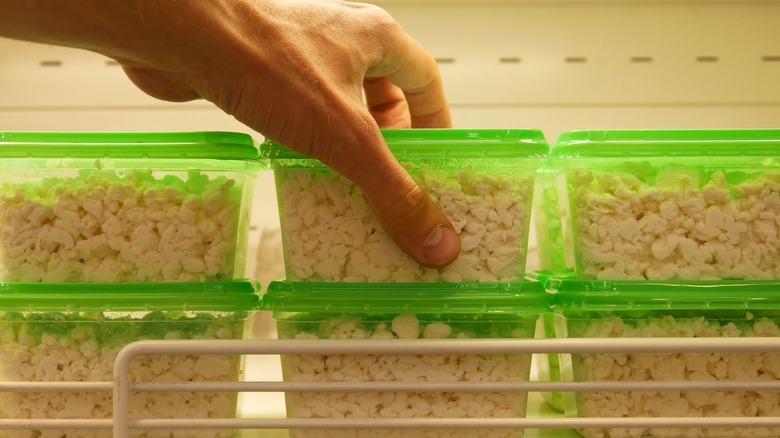Of Course You Can Freeze Cottage Cheese (But Should You?)
Cottage cheese is having a moment thanks to those Gen Z kids and trendy TikTok recipes. It's creamy, it's tangy, and it's packed with protein. But what happens when you find yourself with an extra tub of the stuff? Can you freeze it without turning it into an unrecognizable mess? The short answer is yes, you can freeze cottage cheese. But — and here's the catch — it doesn't exactly freeze the same way as your typical block of cheddar. While it's not on our list of top foods you should never, ever freeze, it does come with some stipulations. Cottage cheese has a high water content, especially the lower fat versions, so freezing it can mess with its texture. When you thaw it out, you're likely to see some separation between the curds and the liquid, which can make it look a little less, well, appetizing.
So, while it's still safe to eat, you might end up with cottage cheese that's more gritty than creamy. If you're okay with that texture change, freezing is a solid option to keep that cottage cheese from going to waste. Just don't expect it to return to its pre-frozen glory. Keep in mind that if you've already opened the tub and it's more than a few days old, you should go ahead and toss it; the risk for mold and/or bacteria isn't worth it. You also don't want to just shove it into the freezer without a plan (because trust us, that never ends well).
How to freeze cottage cheese (and use it later)
Like so many delicious dairy items, full fat is best when it comes to freezing because it'll retain some of the flavor. Don't even bother freezing fat-free cottage cheese, life is too short. Unless you plan on using the whole container at once, divide it into usable servings. Ice cube trays or muffin tins work like a charm. You'll want to seal it tight, as air is the enemy here. Use a freezer-safe container or zip-top bag with all of the air pressed out. Label it with the date, because it will only last one to three months in the freezer. When you're ready to use it, thaw it slowly, but don't leave it out on the kitchen counter. Let it defrost in the fridge overnight. Once thawed, it should be used immediately.
Pour out any extra water on top and give it a stir. Some home cooks suggest adding a dollop of sour cream to bring back some of the creaminess. When you freeze cottage cheese, the texture is the biggest casualty, so the best use is to incorporate it into baked goods like pancakes, breads, or muffins. Savory options include adding it to a cheesy egg or chicken casserole, or even a high-protein "Alfredo" sauce. There's certainly no shortage of lasagna recipes made with cottage cheese, but some Italians claim substituting cottage cheese for ricotta is sacrilege. Regardless of regional culinary preferences, if you're baking, cooking, or just hate waste, go ahead and freeze that cheese.

